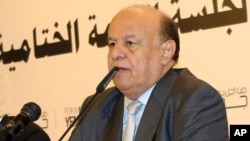Yemen's newly dominant Houthi group said Tuesday that President Abed Rabbo Mansour Hadi had lost his legitimacy as head of state and was being sought as a fugitive from justice.
Houthi militiamen seized the capital, Sana'a, in September and laid siege to Hadi's residence last month, prompting his resignation and leading to a political vacuum.
But Hadi escaped to Aden in southern Yemen last week after a month under house arrest, and on Tuesday he officially retracted his resignation. He now holds court guarded by thousands of tribesmen and army loyalists from the mainly Sunni Muslim south.
"The higher revolutionary committee is following the suspicious moves by Hadi, who lost his legitimacy to act as president of the Republic of Yemen, and whose reckless acts harmed the Yemeni people,'' the Houthis said in a statement.
In a second statement, the committee said it had studied Hadi's conduct during his presidency and referred the file to the public prosecutor.
The power struggle between the Muslim Shi'ite Houthis in Sana'a and Hadi in Aden casts more doubt on U.N.-sponsored talks to resolve Yemen's crisis peacefully. It also exacerbates sectarian and regional splits that may plunge the country into civil war.
"We are seeing a Libya-zation in Yemen. It's polarized between two competing governments. Thankfully, unlike Libya, the competition hasn't descended into fighting yet,'' said Farea al-Muslimi, a researcher with the Carnegie Middle East Center.
Sources close to the president told Reuters he is considering declaring Aden to be Yemen's interim capital until Sana'a is taken back from the Houthis. Loyalist army units and tribesmen from Hadi's neighboring province of Abyan now run the city and much of the south.
The Houthis hail from the Zaydi sect of Shi'ite Islam that ruled Yemen's north for 1,000 years before it became a republic in 1962. They hope to swiftly patch together a caretaker government to replace the one that resigned along with Hadi and Prime Minister Khaled Bahah.
"Sixteen ministers from Bahah's government have agreed. Those who are refusing, we will send to the general prosecutor on charges of treason against the nation,'' the group's al-Masirah television said.
The new tensions are making a negotiated solution less likely and increase the risk of a clash, which the Houthis' opponents hope would lead to their undoing.
"I am not optimistic of the success of the dialog because the main party to it, President Hadi, is not represented there,'' said Ahmed Kelz, a negotiator and a leader in an opposition party. "I expect that just as the Houthis expanded into the north, west and center of Yemen, they will be driven to push south and will drown there.''












